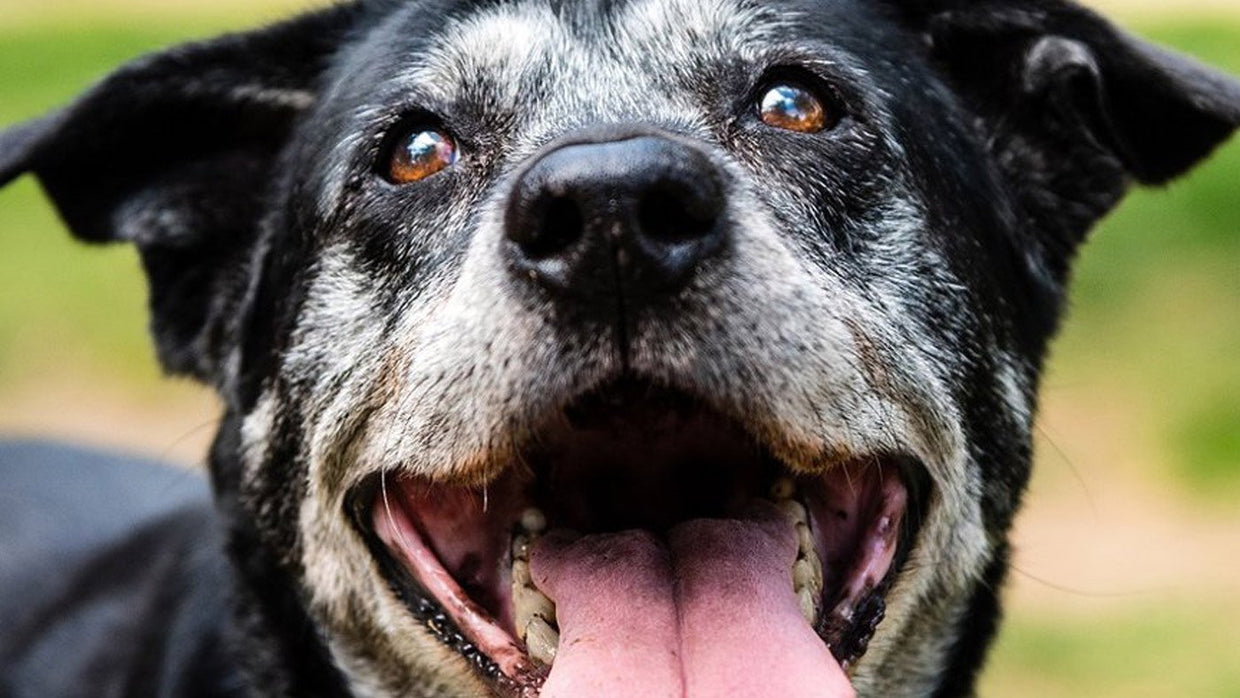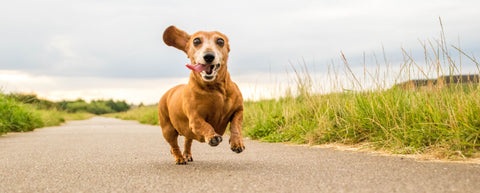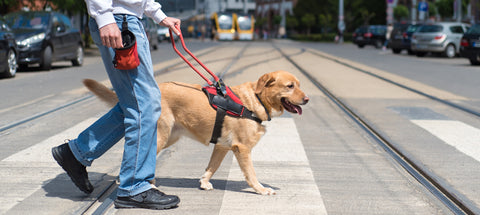How should you be exercising older dogs? Though they may be going grey, it’s still important to keep exercising senior dogs and keep them active. From some top tips for adjusting your daily walks, to joint supplements, and ways you can support your pet to help them feel happier - we've answered some of your questions.

Do older pooches need exercise?
In a word, yes. Older dogs – like older people – tend to be happier and healthier if they keep up regular exercise to suit their age and ability. A walk each day? Yes! The adage ‘move it or lose it’ is also true of our canine friends! The fitter they are today, the more likely it is that they’ll be fit, happy and healthy tomorrow.
Of course, your vet is the best person to guide you on exactly how much exercise your older dog can comfortably enjoy, but there are lots of great reasons to keep your oldie active, including:
- Fun – walks are fun, and almost all dogs love getting out for a walk, even if it’s a slow potter with lot of stops to sniff.
- Keeping in shape – one of the best ways to support older joints is to build and maintain muscle tone.
- Bonding – you can never spend enough time together and taking time out of your day to be with your dog increases happiness for both of you.
- Weight management – older metabolisms can be slower too, so exercise is really important. Any extra weight can put unnecessary stress on your dog’s joints, so keeping them trim is a good idea.

How do you exercise older dogs?
Don’t give up
Even if it seems harder, it's important to keep up regular walks. They'll probably be shorter and slower than in days gone by. It’s easy to just skip walkies when dogs get older, but stick to a regular schedule to maintain fitness and happiness.
Take it steady
Older pooches may not be able to join you on runs and bike rides any more, but a gentle stroll with a few sniff-stops and rests is manageable for most. If your dog has lost strength in his or her back legs, they may do better walking uphill – the incline means the stronger front legs do the hard work. You could then get the bus home for the downhill bit!
Modify your routes and routines
If the highlight of your pooch's day is an off-lead run in the park, but they’re tired by the time you get there, why not drive there? Mixing up the route is a great way to keep them in check and skipping the street-walk saves energy so they can really enjoy their time out.

How do I help my old dog with stiffness?
Try a joint supplement
If your senior dog is experiencing stiff joints, a Green Lipped Mussel and Glucosamine joint supplement can help them to move more freely. YuMOVE Joint Supplements for Senior Dogs – our proven triple-action joint supplement for dogs who are stiff or getting older – soothes stiffness, supports long-term joint health and promotes mobility. Or YuMOVE Joint Care Plus is our joint supplement for older dogs or those with more severe stiffness.
The good news is YuMOVE's joint supplements are proven to help get a more active dog in just 6 weeks*, thanks to ingredients like our ActivEase™ Green Lipped Mussel and Glucosamine. So you'll be seeing results real soon.
If you’re worried about your old dog getting stiff, speak to your vet for more support.
How do I help my dog if he gets tired on walks?
Consider a ‘stroller’
There are some great doggie ‘strollers’ and ‘prams’ on the market these days, including ones suitable for larger breeds. Introduce the pram slowly and patiently with treats, and soon enough your oldie will be able to join you on longer walks again. Some can even attach to your bike!
Once they know there’s an option of a lift when they feel tired, your oldie may surprise you with just how far they can manage. One of us here at YuMOVE has a very elderly staffie who has doubled her regular walking distance thanks to a pram that she can hop into for hills and boring bits.
For dogs who struggle with stairs and hills, another good option is a doggie sling. You pop it around their middle, hold on to the handles, and help to support their weight.

How long should I exercise my older dog for?
Keep it short and sweet
3-4 short walks is easier on your senior dog than one long one – and makes for a more interesting day for them. If you’re not at home in the day time, some dog walkers even offer shorter oldie walks. Instead of taking your oldie on a long ramble that may leave them stiff the next day, they might be able pop by for a couple of shorter visits.
My dog is less mobile but still enjoys going out. What can I do?
Go out on an urban exploration
If your dog is happy and confident in busy situations – and enjoys meeting new people – you might consider taking them on urban rambles. More smells, sights and sounds can make even very short walks great mental stimulation. Open air markets and outside shopping precincts can also be great fun for confident dogs, especially if they love meeting new people. On rainy days, a walk around a pet store can be a great alternative to getting old bones cold and wet!
If your dog is more timid, stick to short, familiar routes, but try some new movements at home. A gentle tug of war can build strong neck and back muscles. Hide and seek with favourite toys is fun and your dog controls the pace. Or you could even talk to your vet about yoga-style stretches and massages to suit your dog’s needs.
Want some extra ways to help old dogs exercise?
Here are a few other things you can try in order to keep your older dog active:
- Swimming and hydrotherapy – great for building strong muscles to support older bones, and the water takes the strain.
- Short walks – to break up the day and increase steps. 3 to 4 walks of 15 minutes soon adds up!
- Brain games – for dogs who can’t physically manage lots of exercise, exercise their minds instead.
- Balance training – another good one to build muscle tone, there’s a great guide here.
- Trick training – you absolutely can teach old dogs new tricks, and trick training is a great way to bond with and tire out less mobile dogs. Why not teach your older dog to read or play dead?
Do you have any exercise ideas for oldies that other pet parents might find useful? Please do leave a comment on our Facebook and Instagram pages – we always love hearing from you.
*Study conducted by Royal Veterinary College, London UK.










